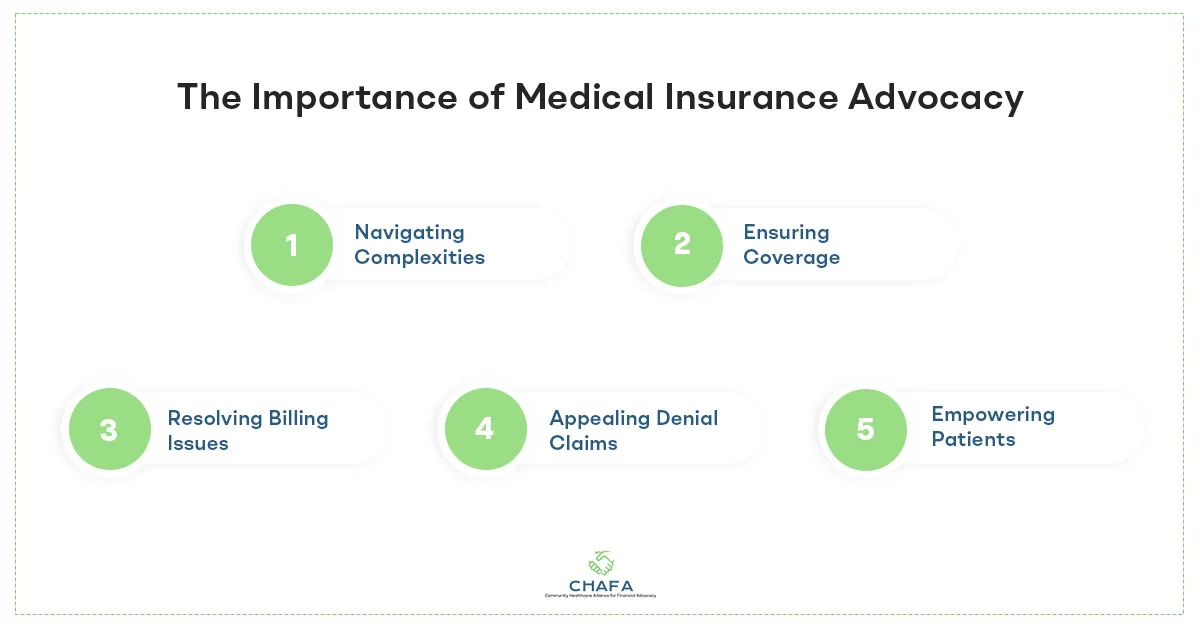
It can be difficult to navigate medical insurance, given that it is as complicated as it can be. Many become overwhelmed and frustrated with comprehending coverage options and handling claim denials.
This is where medical insurance advocacy comes into play, providing patients with the
Understanding Medical Insurance Advocacy
Helping patients navigate the complexity of the healthcare system, especially concerning insurance issues, is the role of a medical insurance advocate.
Acting as a link between patients and insurance providers, advocates help clients comprehend their benefits, resolve billing disputes, contest denials of claims, and guarantee they obtain the necessary medical attention.
The Importance of Medical Insurance Advocacy
The importance of medical insurance advocacy cannot be overstated, especially in a healthcare system as complex and multifaceted as that of the United States.

1) Navigating Complexities
There are many complexities in the healthcare and insurance industries, such as convoluted policies, complex billing processes, and constantly changing rules.
It can be intimidating for the average individual to comprehend these intricate details. Advocates for medical insurance act as mentors, assisting patients in making sense of this confusing process and gaining confidence.
2) Ensuring Coverage
Many people may find it difficult to understand the tiny print in their insurance plans or are ignorant of the complete scope of their coverage. Advocates for medical insurance make sure that clients are aware of their alternatives for coverage and are maximizing their advantages.
Advocates that support universal coverage assist people in receiving the necessary medical care without facing financial obstacles.
3) Resolving Billing Issues
Inaccuracies and inconsistencies in medical billing are regrettably frequent in the healthcare sector. Administrative mistakes can result in patients receiving inflated invoices, inaccurate charges, or denials of claims.
In order to protect patients from needless financial hardship, medical insurance advocates carefully review billing statements, spot any medical coding errors, and fight for proper billing procedures.
4) Appealing Denial Claims
Insurance companies routinely reject claims for a variety of reasons, such as inadequate evidence or coverage restrictions. Refusals of claims can pose serious challenges for patients seeking essential medical care and services.
To guarantee that patients receive the care they require without unnecessary delay, medical insurance advocates are experts at navigating the appeals process, assembling evidence, and arguing for claim approval.
5) Empowering Patients
Advocates for medical insurance provide patients the power to take an active role in their healthcare process. Advocates give patients the information and resources they need to make wise decisions about their care, successfully navigate the healthcare system, and stand out for their rights as healthcare consumers.
How Does Medical Insurance Advocacy Work?
Medical insurance advocates work closely with patients to assess their insurance coverage, understand their healthcare needs, and develop strategies to address any challenges they may encounter.
This usually involves reviewing insurance policies, communicating with healthcare providers, filing appeals, and negotiating medical bills.
Here’s a breakdown of how medical insurance advocacy works:
1) Initial Assessment
During this period, the medical insurance advocate gathers relevant information from the patient, including their insurance policy details, medical history, and any ongoing issues or concerns related to insurance coverage.
2) Review Insurance Coverage
The patient’s insurance policy is thoroughly examined by the advocate to determine the full scope of coverage, including benefits, exclusions, and limits. This stage is essential for figuring out the extent of coverage that is offered and locating any inconsistencies.
3) Identifying Issues
Based on the prior assessments, the medical advocate then identifies any issues that could be impeding the patient’s access to necessary healthcare services amd impacting their ability to receive fair insurance coverage.
4) Strategizing
The advocate creates specialized strategies to address the issues found and maximize the patient’s insurance benefits. This could entail taking several different tacks, like arguing for policy modifications or exceptions, negotiating with insurance companies, or appealing claim denials.
Even after issues are resolved or claims are approved, the advocate continues to monitor the patient’s insurance coverage and healthcare needs, providing ongoing support and assistance as needed.
Benefits of Medical Insurance Advocacy
The benefits of medical insurance advocacy are manifold. Some of the key advantages include:
- Access to Expertise: Medical insurance advocates possess specialized knowledge of insurance policies, billing practices, and healthcare regulations, enabling them to navigate the system more effectively.
- Assistance with Claim Denials: When insurance claims are denied, advocates can help patients understand the reasons for denial, gather supporting documentation, and file appeals to overturn unfavorable decisions.
- Reduction of Financial Burden: By ensuring that patients receive the maximum coverage available under their insurance policies, advocates help minimize out-of-pocket expenses and alleviate financial strain.
- Timely Access to Care: Advocates work diligently to expedite the approval of medical treatments and procedures, ensuring that patients receive timely access to the care they need to manage their health conditions effectively.
Choosing a Medical Insurance Advocate
When selecting a medical insurance advocate, it is essential to consider factors such as experience, expertise, reputation, and compatibility with your needs and preferences.
It is advisable to seek recommendations from healthcare providers, patient support groups, or trusted sources and to conduct thorough research before making a decision.
In conclusion, medical insurance advocacy plays a vital role in helping patients navigate the complexities of the healthcare system and ensure they receive the coverage and care they need.
Contact CHAFA to learn more about medical insurance advocacy and our services.

